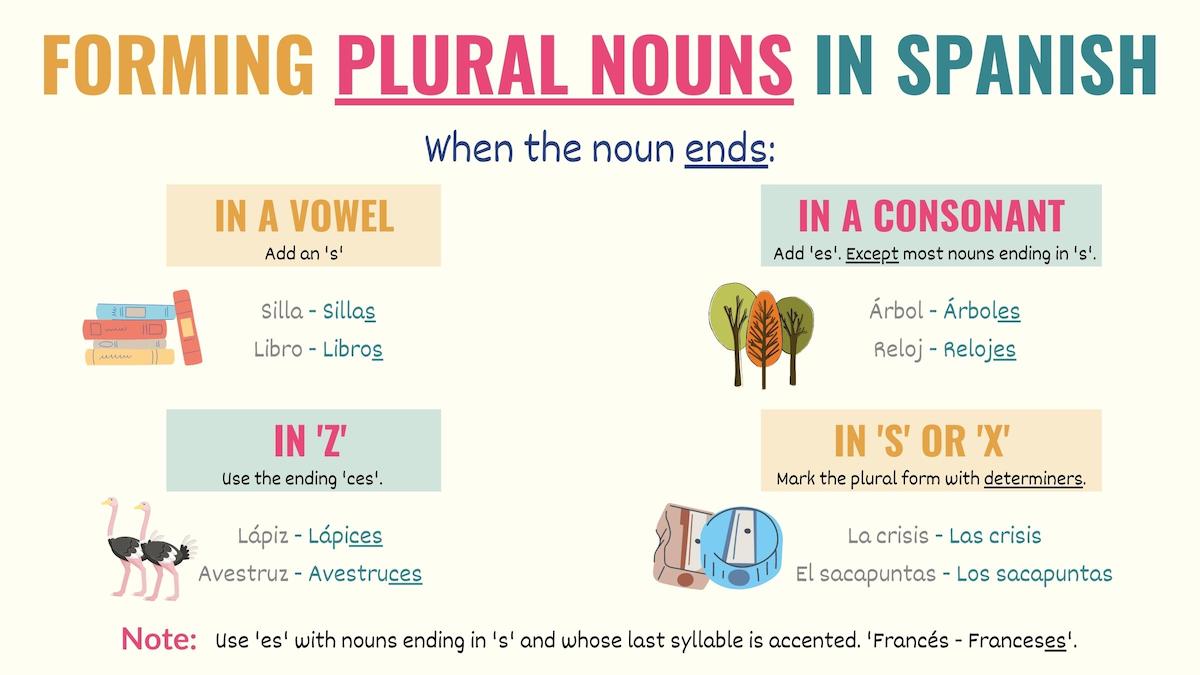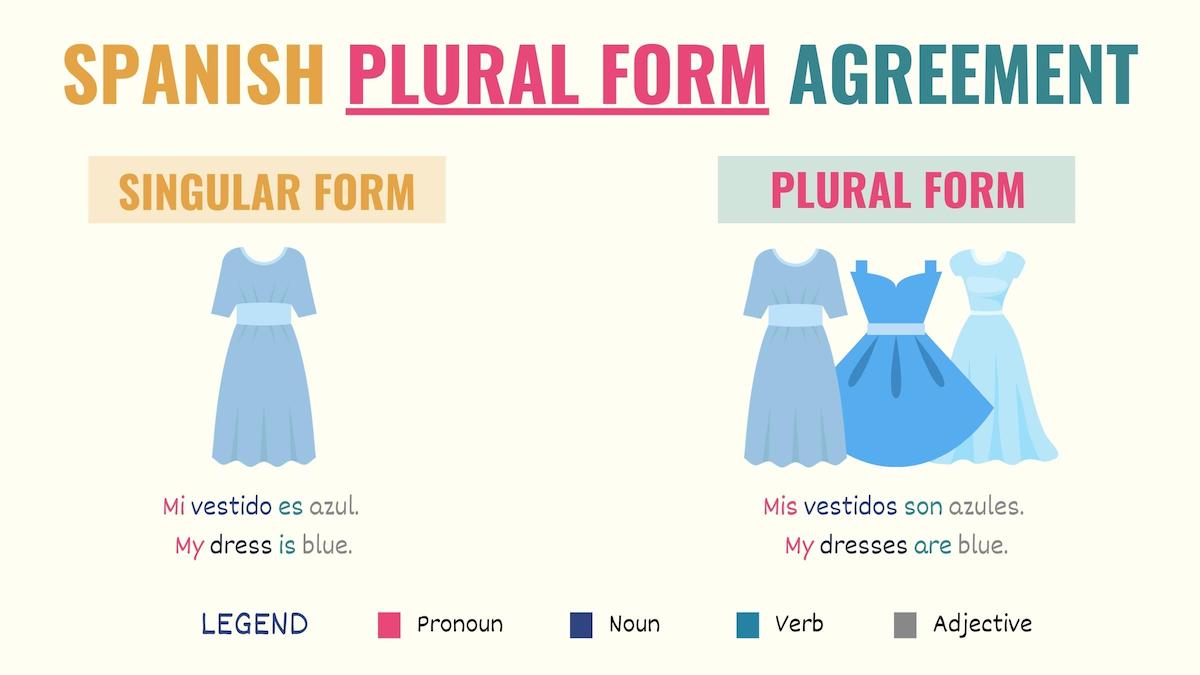

Spanish Plural Words 101: Making Nouns Plural in Spanish

The plural forms are crucial to use nouns correctly. So, in this guide, you’ll learn how to change a noun from singular to plural in Spanish. Here is a quick summary of what we’ll cover:
- Endings for Plural Forms
- Plural Adjectives, Verbs & Pronouns (Agreement)
- Words that Are Always Plural
- Downloadable PDF
Take Note : The pluralization rules you’re about to learn are applied to all Spanish nouns .
Forming Plurals: Rules for Plural Nouns in Spanish
Spanish plural nouns are used to communicate that we’re talking about two or more people, things, places, or ideas.

The rules to form Spanish plurals are:
Spanish nouns ending in a vowel
With nouns that end in a vowel, add an ‘s’ to change it to a plural noun. For example:
Take Note: Nouns ending in ‘ í ’ or ‘ ú ’ can use endings ‘s’ or ‘es’. For example, bisturí can have two plural forms – bisturís or bisturíes.
Nouns ending in a consonant
The plural form for nouns that end with a consonant is formed with the ending ‘-es’ . This rule doesn’t apply to most singular nouns ending in ‘s’. Check these examples:
Take Note : When forming Spanish plural words, we change the stressed syllable. According to accent rules, this change sometimes prevents you from using an accent mark. For example, nouns ending with – ión always drop the accent mark in their plural form.
Nouns ending in ‘z’
Nouns that end with a ‘z’ must use the plural ending ‘- ces ’. You can see some examples in the table below:
Take Note: When it comes to plural nouns, we replace a ‘z’ with a ‘c’ for spelling purposes. You will also see this spelling change in verb conjugations to keep the pronunciation consistent.
Nouns that end with ‘s’ or ‘x’
For the most part, Spanish nouns that end with an ‘s’ or ‘ x’ are invariable (constant), meaning you cannot add a plural ending to them. With these words, the plural form is marked through the definite article or other Spanish determiners you use:
Take Note: The Spanish days of the week is a set of nouns that follow this rule.
However, you must use the plural ending ‘-es’ if a noun ends in ‘-s’ and their last syllable is accented:
Spanish Grammar: Noun, Verb, Pronoun & Adjective Plural Agreement
A basic rule in Spanish grammar is agreement. Simply put, ‘agreement’ means that all of the elements in your sentence match in number (singular or plural) and, in some cases, gender .
Check these singular and plural sentences:

As you can see in the graphic above, plural adjectives in Spanish are formed by following the same pluralization rules as nouns. For example: azul becomes azules.
Pronouns must take the characteristics of the noun they replace. So, when working with plural nouns, you must ensure that you use the appropriate plural pronoun. Finally, you must use a third-person plural verb conjugation if the verb describes the noun or refers to the action performed by it.
For example:
Take Note : Unlike English, many Spanish parts of speech must use a plural form. Nouns , pronouns, adjectives, and verbs are words that are pluralized if needed.
Bonus: Words that Are Always Plural in Spanish
In Spanish, there are some words that are always used in plural form. Here are some examples of these nouns:
- Añicos (formal) – Pieces
- Cosquillas – Tickle
- Gafas – Glasses
- Lentes – Glasses
- Tijeras – Scissors
- Trabalenguas – Tongue twister
- Vacaciones – Vacation / Holiday
- Víveres – Provisions / Supplies
Take Note: Remember that there are some nouns in Spanish that end with an ‘s’ and have a singular and plural form, which you will mark with a determiner word ( el análisis vs los análisis).
Knowing the rules for plural words is an essential part of basic grammar. Here are some points you should keep in mind:
- A plural noun is used when talking about more than one person, thing, place, or idea.
- ‘s’ for nouns ending in vowels. Casa vs Casas.
- Only use this ending with words that end with ‘s’ if their last syllable has an accent mark.
- ‘ces’ for nouns ending in ‘z’. Lápiz vs lápices.
- If a noun ends with ‘s’, you must mark the singular and plural form with a determiner word .
- When changing a noun from singular to plural, some accent marks may be dropped.
- The plural form is applied to nouns, adjectives, pronouns, and verb conjugation as needed.
Download PDF
Enjoyed the guide? I’ve made a PDF you can download with the highlights for you to review the main concepts of how to make words plural in Spanish along with the rules, key points, graphics and examples.
Daniela Sanchez
¡Hola! Soy Daniela Sanchez, I've been studying Spanish professionally as well as teaching it in Mexico and online for over 10 years. I’ve taught Spanish to a wide array of foreigners from many backgrounds. Over the years, I've made it my mission to work hard on refining many challenging to understand grammar topics to make my students' learning experiences easier, faster and more enjoyable. Read More About Me
Recent Posts
Muy vs Mucho: Key Differences Explained (+ Examples)
Muy means ‘very’. It intensifies the qualities described by an adjective or another adverb. Mucho is the equivalent of ‘a lot’ or ‘very much’, and it conveys the intensity or degree of an...
Spanish 101: Gusta vs Gustan? - Pronouns, Examples + Tips
The distinction between Gusta vs gustan often confuses most of my Spanish students. As a singular conjugation, gusta is used with singular nouns or infinitive verbs (a single thing or activity)...
Pin It on Pinterest
Plural Nouns in Spanish Grammar
Nouns ending in a vowel, nouns ending in a consonant, special cases, singular or plural.
- Lingolia Plus Spanish
How to form the plural of Spanish nouns
The plural form of a noun refers to multiple or more than one of something. When a noun is plural the accompanying article is also plural.
In Spanish grammar the plural ending is usually -s or -es and articles also take -s in their plural form. In general, nouns have a singular and a plural form, although this is not always the case: like in English, there are nouns that only exist in the singular (e.g. la salud health ), and nouns that only exist in the plural (e.g. las fauces jaws ).
Learn how to form the plural of Spanish nouns with Lingolia’s grammar lesson, then test yourself in the exercises below.

los billetes de banco
las monedas
el dinero (no plural)
Nouns that end in a vowel (a, e, i, o, u) usually take the plural ending -s .
If the final letter is a stressed í or ú , then we add the plural endings -s or -es.
However, nouns that come from other languages only take the plural ending -s .
Nouns that end with the consonants - d, -j, -l, -n, and -r take the plural ending - es .
A -z at the end of a word changes to - c before taking -es .
Foreign words that end with a consonant form the plural with either - s or - es .
When the plural is formed by adding -es , the word gains an extra syllable. In order to keep the stress on the correct syllable, it may be necessary to add or remove an accent in some words.
Nouns that end with -s or -x and have an unstressed final syllable do not take any extra ending in the plural.
However, if the final syllable is stressed, we add - es .
Most nouns can be used in the singular and in the plural.
However, some nouns only exist in the singular.
While some nouns only exist in the plural.
There are also nouns that have the same form in singular and plural.
Some nouns that are only plural in English can be singular or plural in Spanish.
How good is your Spanish?
Find out with Lingolia’s free grammar test
Take the test!
Maybe later
To support our work, we invite you to accept cookies or to subscribe.
You have chosen not to accept cookies when visiting our site.
The content available on our site is the result of the daily efforts of our editors. They all work towards a single goal: to provide you with rich, high-quality content. All this is possible thanks to the income generated by advertising and subscriptions.
By giving your consent or subscribing, you are supporting the work of our editorial team and ensuring the long-term future of our site.
If you already have purchased a subscription, please log in
What is the translation of "homework" in Spanish?
"homework" in spanish, homework {noun}.
- volume_up tarea
homeworker {noun}
- volume_up trabajador desde casa
- trabajadora desde casa
homeworking {noun}
- volume_up trabajo desde casa
do homework {vb}
- volume_up hacer tarea
- hacer deberes
Spanish translations powered by Oxford Languages
Homework noun, translations.
- open_in_new Link to source
- warning Request revision
do homework {verb}
Context sentences, english spanish contextual examples of "homework" in spanish.
These sentences come from external sources and may not be accurate. bab.la is not responsible for their content.
Monolingual examples
English how to use "homework" in a sentence, english how to use "homeworker" in a sentence, english how to use "homeworking" in a sentence, english how to use "do homework" in a sentence, english how to use "trabajador desde casa" in a sentence, english how to use "trabajo desde casa" in a sentence, english how to use "hacer tarea" in a sentence, english how to use "hacer deberes" in a sentence, collocations, "assigned homework" in spanish.
- volume_up tarea asignada
"assign homework" in Spanish
- volume_up asignar tareas
- volume_up asignar la tarea
"homework assignment" in Spanish
- volume_up asignación de tareas
- volume_up Tarea
Synonyms (English) for "homework":
- preparation
- hometown boy
- hometown crowd
- hometown discount
- hometown fans
- hometown hero
- hometown newspaper
- hometown paper
- hometown pride
- homeward journey
- homework assignment
- homework assistance
- homework completion
- homework help
- homework load
- homework session
- homeworking
- homey feeling
Translations into more languages in the bab.la English-Portuguese dictionary .
Social Login
- Cambridge Dictionary +Plus
Translation of homework – English–Spanish dictionary
Your browser doesn't support HTML5 audio
- The kids are busy with their homework.
- My science teacher always sets a lot of homework.
- "Have you got any homework tonight ?" "No."
- I got A minus for my English homework.
- For homework I want you to write an essay on endangered species .
(Translation of homework from the Cambridge English-Spanish Dictionary © Cambridge University Press)
Translation of homework | GLOBAL English–Spanish Dictionary
(Translation of homework from the GLOBAL English-Spanish Dictionary © 2020 K Dictionaries Ltd)
Examples of homework
Translations of homework.
Get a quick, free translation!

Word of the Day
a group of four people who play musical instruments or sing as a group

Shoots, blooms and blossom: talking about plants

Learn more with +Plus
- Recent and Recommended {{#preferredDictionaries}} {{name}} {{/preferredDictionaries}}
- Definitions Clear explanations of natural written and spoken English English Learner’s Dictionary Essential British English Essential American English
- Grammar and thesaurus Usage explanations of natural written and spoken English Grammar Thesaurus
- Pronunciation British and American pronunciations with audio English Pronunciation
- English–Chinese (Simplified) Chinese (Simplified)–English
- English–Chinese (Traditional) Chinese (Traditional)–English
- English–Dutch Dutch–English
- English–French French–English
- English–German German–English
- English–Indonesian Indonesian–English
- English–Italian Italian–English
- English–Japanese Japanese–English
- English–Norwegian Norwegian–English
- English–Polish Polish–English
- English–Portuguese Portuguese–English
- English–Spanish Spanish–English
- English–Swedish Swedish–English
- Dictionary +Plus Word Lists
- English–Spanish Noun
- do your homework
- Translations
- All translations
Add homework to one of your lists below, or create a new one.
{{message}}
Something went wrong.
There was a problem sending your report.
You are using an outdated browser. Please upgrade your browser or activate Google Chrome Frame to improve your experience.
The Spanish Plural: 8 Simple Rules to Master It
In English, you can add an “s” or “es” to make most words plural.
But forming the plural in Spanish is a bit different.
Don’t worry, though, it’s not too difficult! The Spanish plural can still be summarized in just eight simple rules.

The Plural in Spanish
- 8 Simple Rules for Forming the Spanish Plural
1. Match the article to the noun in both gender and number
2. add an “s” to nouns that end in vowels, 3. add “es” to nouns that end in consonants, 4. add “es” and drop the accent over the “o” if the noun ends in “ión”, 5. if a noun ends in “z”, add “es” and change the “z” to “c”, 6. nouns ending in “c” or “g”, change “c” → “qu” and “g” → “gu”, respectively, 7. when the noun ends in “s” or “x” and the last syllable is unstressed, only change the article to plural, 8. when the plural refers to two or more nouns of different genders, use the masculine plural, practical tips and general advice.
Download: This blog post is available as a convenient and portable PDF that you can take anywhere. Click here to get a copy. (Download)
The plural, also referred to as “number” in Spanish, is very similar to the plural in English. The endings of each noun indicate whether the noun (a person, place, idea or thing) is single (just one) or is in company (more than one). This is the beauty of numbers in grammar: it only has two variations, one and more than one!
The plural also takes into account the gender of the noun. Keeping track of gender and number while trying to think of words in a foreign language can make you feel overwhelmed and inadequate. The words may swirl around in your head and pair up erroneously, deflating your motivation.
Although it’s all a completely normal part of learning the language, particularly if you’re teaching yourself , these next eight rules should help untie the knot that formed in your cabeza (singular, feminine noun for “head”).
8 Simple Rules for Forming the S panish Plural
Words in Spanish are very organized. They cannot be separated from their kind or they will lose meaning. Whenever you are forming a sentence, you must make sure the article agrees with its noun in both gender and number.
This means that if the word is singular, the article must also be singular. If the noun is feminine, its article must be feminine as well.
Also, the articles differ depending on whether they’re definite or indefinite.
Definite articles are used when both speaker and listener have identified the noun. In English, the word “ the ” is used as the only variation.
Indefinite articles are used when the nouns are used in “general and broad” terms. In English the indefinite articles are “ a ” or “ an .”
*Although it may seem like too many articles to remember, they follow the same pattern: male, female, singular, plural. Even easier, they all have the same endings except for “un” and “el ! “
Spanish nouns can be plural or singular. Nouns that end in vowels are made plural by adding an “s” to the end. Here are some examples:
Accent marks exist in Spanish to add stress to the syllable that they (literally) accentuate. It’s a little like putting up balloons on your mailbox the day of your birthday party, so your guests will know which is your house. You add a distinctive mark to it in order to stress, or accentuate, where you live. This is exactly what accent marks do for words in Spanish; they add attention to the place where more stress/strength is required.
Sometimes, the accent mark is no longer needed when a word becomes plural. Luckily there are simple rules to follow regarding Spanish accent marks , but we’ll spell out one specific case here.
When a word ends in -ión , drop the accent over that last “ o ” when the word becomes plural. Take a look at these examples:
Some words are a little more sensitive, sophisticated or picky (whatever you want to call it) than others. When a singular noun ends in “ z “, change the “ z ” to “ c ” and add “ es ” to make it plural.
*The word lápiz keeps its accent mark in the plural because its accent doesn’t fall on the last syllable.
Similarly, when singular nouns end in “ c ,” their final letter changes to “ qu ” before adding “- es.” And when singular nouns end in “ g ,” their final letter changes to “ gu ” before adding “ -es. “
There are some words that remain the same in both the plural and the singular. In these cases, the only change occurs in the noun’s article.
*As you can see, most days of the week don’t change in the plural.
1 Male Plural + 2 Female Plurals = 3 Male Plurals
The Spanish language is programmed to be m asculine by default. No matter what the ratio of males to females is, if there’s one male in the mix, the word will automatically be in the masculine gender in the plural form.
When there’s a mixed group, however, the meaning of the word is neutralized. In other words, it’s understood that there are females and males in the mix.
Keeping track of the –o, -os, -a, -as endings can be confusing and frustrating at first. Simply remember that Rome was not built in a day and that mistakes pave the pathway to wisdom. So, embrace them and learn from them.
Above all, release any and all expectations of perfection and keep your goals simple, small and daily. Releasing expectations allows you to experience unlimited possibilities at a slower yet ultimately more rewarding pace.
If you’re looking for other ways to practice plurals, surrounding yourself with the language can help train your ears to hear the concept in practice.
Watching movies or TV shows in Spanish can help you further familiarize yourself with the Spanish plurals. Using programs that specialize in immersion for learners can also help you dive in. For example, the FluentU program uses authentic Spanish videos to provide context for your learning and immerse you in the language so that you can learn Spanish plurals directly from native speakers.
The Spanish language, unlike English, notices every detail of its world. Training your mind to think in this way will require time, but will ultimately yield new experiences, so be patient and suspend your judgment! Lastly, practice, listen, and label! These three verbs will take your language learning to new heights if you do them daily!
¡Buena suerte!
Enter your e-mail address to get your free PDF!
We hate SPAM and promise to keep your email address safe


Spanish translation of 'homework'

Video: pronunciation of homework

Examples of 'homework' in a sentence homework
Trends of homework.
View usage over: Since Exist Last 10 years Last 50 years Last 100 years Last 300 years
Browse alphabetically homework
- homeward journey
- homework club
- homeworking
- All ENGLISH words that begin with 'H'
Related terms of homework
- he’s having terrible trouble with his homework
- The lesson itself was easy, but the homework was very difficult.
- he galloped through his homework
- watch he does his homework
- View more related words
Quick word challenge
Quiz Review
Score: 0 / 5
Wordle Helper

Scrabble Tools
- Rules/Help/FAQ Help/FAQ
- Members Current visitors
- Interface Language
Follow along with the video below to see how to install our site as a web app on your home screen.
Note: This feature may not be available in some browsers.
- English Only
Homework - singular or plural?
- Thread starter Mr_Croft
- Start date Nov 19, 2007
- Nov 19, 2007
Senior Member
I haven't ( have not) done it. It is singular. My homework is singular. It names the collective tasks I have to do. Bienvenido mr_Croft! Note: Some dictionaries describe this noun as "uncountable". There are many threads here about uncountable nouns. You may find them by using the forum Search feature, or by looking up the word "uncountable" in the WordReference English dictionary. It will display threads with that word in the title: Forum discussions with the word(s) 'uncountable' in the title: Countable and uncountable, depending on context! Countable, uncountable: asparagus Countable, uncountable: homework Uncountable nouns - an exercise is the word "cheese" uncountable? Countable, uncountable: mail, e-mail Countable, uncountable: broccoli, orange Countable, uncountable: advice, bread, cabbage, hair, onions Countable, uncountable: chocolate, chocolates Countable, uncountable: food Countable, uncountable: news Two uncountable nouns become plural? Countable, uncountable: peanuts, people Should the verb be singular or plural after two uncountable nouns? Countable and uncountable, depending on context! uncountable luck Biker, Sponsor: UNCOUNTABLE??? is or are with a list of uncountable Countable, uncountable: help Countable, uncountable: snow Two types of uncountable nouns. the use of articles with uncountable nouns Countable, uncountable: patience "Advice" - uncountable??? Tip (countable or uncountable)
The last time we talked about this, everyone but me said that homework is not countable. Countable, uncountable: homework But in this particular example, even I would say: I haven't done my homework. Have you done your homework? I haven't done it yet. - - - even if I have homework to do in several different subjects.
Homework Plural, What is the plural of Homework?
Meaning: schoolwork that a pupil is required to do at home.
Table of Contents
Plural of Homework
Homework as a singular noun in example sentences:.
- I finished my homework before dinner.
- The teacher assigned a lot of homework
- Sarah forgot to bring her homework to school.
- The math homework was challenging but interesting.
- Can you help me with my English homework ?
- I need to complete my homework by tomorrow morning.
- The homework deadline is at midnight tonight.
- I can’t go out tonight because I have homework .
- My sister always finishes her homework
- The homework assignment was confusing and difficult.
Homework as a Plural Noun in Example Sentences:
- The students submitted their homework
- The teacher collected the students’ homework .
- Did you finish all your homework before the deadline?
- The students were given a lot of homework this week.
- I have to grade the students’ homework over the weekend.
- The homework tasks were varied and challenging.
- The students discussed their homework answers in class.
- The teacher reviewed the correct answers to the homework .
- The homework assignments were returned with feedback.
- The students received high scores on their homework .
Singular Possessive of Homework
The singular possessive form of “Homework” is “Homework’s”.
Examples of Singular Possessive Form of Homework:
- I need to complete Homework’s assignment.
- The teacher checked Homework’s answers.
- Homework’s due date is tomorrow.
- I left Homework’s notebook at school.
- I have to organize Homework’s papers.
- The dog chewed up Homework’s textbook.
- I struggled with Homework’s math problems.
- The tutor explained Homework’s instructions.
- Homework’s complexity overwhelmed me.
- The library is a quiet place for Homework’s concentration.
Plural Possessive of Homework
The plural possessive form of “Homework” is “Homeworks'”.
Examples of Plural Possessive Form of Homework:
- The students exchanged Homeworks’ answers.
- The pile of Homeworks’ assignments grew.
- The teacher collected the Homeworks’ notebooks.
- I struggled to complete all the Homeworks’ requirements.
- The group divided the Homeworks’ workload.
- The school organized a competition for the best Homeworks’ presentations.
- The students helped each other with the Homeworks’ difficulties.
- The online platform stores the Homeworks’ files.
- The classmates shared their Homeworks’ solutions.
- The parents checked their children’s Homeworks’ progress.
Explore Related Nouns:
- Complete List of Singular Plurals
Last updated on June 10th, 2023 at 08:29 pm
Related Posts

Pro Plural, What is the Plural of Pro?

Lunch Plural, What is the Plural of Lunch?

Volume Plural, What is the Plural of Volume?

Spouse Plural, What is the Plural of Spouse?

Research Plural, What is the Plural of Research?

Criteria Plural, What is the Plural of Criteria?
About the author.
Hi, I'm USMI, engdic.org's Author & Lifestyle Linguist. My decade-long journey in language and lifestyle curation fuels my passion for weaving words into everyday life. Join me in exploring the dynamic interplay between English and our diverse lifestyles. Dive into my latest insights, where language enriches every aspect of living.
bottom_desktop desktop:[300x250]

IMAGES
VIDEO
COMMENTS
You wouldn´t say "mis tareas" because it is already referring to an unquantifiable number of homework. In English, you don´t say "homeworks." The word "homework" refers to a little or a lot. In Spanish it is the same, and "mi tarea" is appropriate for all situations, whether you have one class's worth or fifteen hours' worth.
Senior Member. argentina spanish. Oct 5, 2007. #3. As far as I know homework is an uncountable noun and has no plural. I'm doing / I'm going to do my homework. M.
The plural endings in Spanish are: 's' for nouns ending in vowels. Casa vs Casas. 'es' for nouns ending in consonants except 's'. Reloj vs relojes. Only use this ending with words that end with 's' if their last syllable has an accent mark. 'ces' for nouns ending in 'z'. Lápiz vs lápices.
feminine noun. 1. (education) a. homework. La profesora de francés les dio mucha tarea. The French teacher gave them lots of homework. 2. (work) a. task. Tengo tantas tareas urgentes que no sé por cuál empezar.I have so many urgent tasks that I don't know where to begin. b. job.
Jimmy gets a lot of homework. Jimmy recibe muchos deberes. homework n. (preparation) (coloquial) estudio preliminar nm + adj mf. trabajo nm. I have done my homework, and am well prepared for the meeting. He hecho el estudio preliminar y estoy preparado para la reunión.
The plural form of a noun refers to multiple or more than one of something. When a noun is plural the accompanying article is also plural. In Spanish grammar the plural ending is usually -s or -es and articles also take -s in their plural form. In general, nouns have a singular and a plural form, although this is not always the case: like in ...
Translation for 'homework' in the free English-Spanish dictionary and many other Spanish translations.
HOMEWORK translate: deberes, tarea, deberes [masculine], tarea [feminine]. Learn more in the Cambridge English-Spanish Dictionary.
Senior Member. Portland, Oregon, USA. American English. Jun 7, 2009. #3. "homework" is always a singular noun, I have never heard "homeworks" used, although it may be dialectical to some groups. ie: There is a lot of homework to do tonight for Spanish.
Spanish Translation of "HOMEWORK" | The official Collins English-Spanish Dictionary online. Over 100,000 Spanish translations of English words and phrases.
8 Simple Rules for Forming the Spanish Plural. 1. Match the article to the noun in both gender and number. 2. Add an "s" to nouns that end in vowels. 3. Add "es" to nouns that end in consonants. 4. Add "es" and drop the accent over the "o" if the noun ends in "ión".
In Spanish, when nouns end in a vowel, simply add an "-s". For example, the following words take an -s in the plural form: un libro becomes unos libros (some books) una mesa becomes unas mesas ...
noun. deberes mpl ⧫ tarea f. my geography homework mis deberes de geografía ⧫ mi tarea de geografía. to do one's homework (= schoolwork) hacer los deberes or la tarea; (figurative) documentarse ⧫ hacer el trabajo preparatorio.
What's the Spanish word for homework? Here's a list of translations. Spanish Translation. deberes. More Spanish words for homework. la tarea noun. task, job, assignment, labor, labour. los deberes noun.
Nov 12, 2008. #5. As I learned English growing up ''Homework'' was always singular. I have heard my children and some of their friends use ''homeworks'', however. In this usage, each homework assignment from a different class or teacher was a separate "homework''. I consider ''homeworks'' to be substandard English, but it's certainly not ...
Spanish, Spain Nov 19, 2007 #1 Hello everyone, I'm writing to you because I need some help. ... I just want to know if the word homework is a singular word or a plural one. Thank you very much, PS: Please, if you find any mistake in my text, just let me know . cuchuflete Senior Member. Maine, EEUU. EEUU-inglés Nov 19, 2007 #2 I haven't ( have ...
The library is a quiet place for Homework's concentration. Plural Possessive of Homework. The plural possessive form of "Homework" is "Homeworks'". Examples of Plural Possessive Form of Homework: The students exchanged Homeworks' answers. The pile of Homeworks' assignments grew. The teacher collected the Homeworks' notebooks.
The noun homework can be countable or uncountable. In more general, commonly used, contexts, the plural form will also be homework . However, in more specific contexts, the plural form can also be homeworks e.g. in reference to various types of homeworks or a collection of homeworks. Find more words!
the best spanish-english dictionary Get More than a Translation Get conjugations, examples, and pronunciations for millions of words and phrases in Spanish and English.